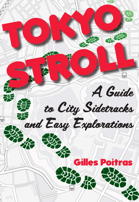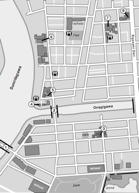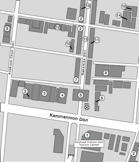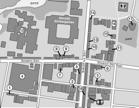











Tokyo Stroll Supplement: Gift Shopping Suggestions

Tips and a curated list of shops for unique gift shopping in Tokyo, including for yourself.
For information on Tokyo Stroll and this web supplement see Tokyo Stroll Supplement home page
For users of the Organic Maps, Maps.Me and Google Maps apps the items below have bookmarks you can import into those apps to make navigation easier.
Instructions and links are on the Viewing Locations in Organic Maps, Maps.Me, Google Maps, or Google Earth page.
Tokyo has so many shops you can easily discover gems and miss great shops. This page consist both of general shopping tips and recommendations of specific shops. The page numbers for entries in Tokyo Stroll are listed in parenthesis after shop names, links are to entries in this web supplement. Read the descriptions in Tokyo Stroll or in the linked entries in this supplement to see exactly what each entry has.
One recommendation I have is to buy extra items for gift giving throughout the year. You don't need to haul these in your luggage many shops will ship for you, or you can send them by mail, choose the cheapest option as there is no rush. Be sure to have the receipts tallied up to the total amount of yen you are shipping for the custom forms. The ones you want to give soon after arrival can be in your luggage, or carry on for especially fragile items.
If you are shopping for very specific items: books, DVD, Blu-ray, CDs, etc. have a printout with the name and picture of the item. Just locate it on the internet to obtain that information and do a printout. This makes shopping for them very easy.
There is a tradition in Japan of buying locally made gifts. So if you are in Tokyo buy something from that area or a place you visit on a day trip.
Tax Free shopping.
There are some shops where you can buy items on the Tax Free system. The total has to be over 5000 yen. Just show your passport before making the purchase. Consumables have to be placed in a sealed bag and not opened before departure. They cannot be used or otherwise consumed in Japan or given to someone else. At the airport you have to go to customs before checking baggage with your items. If you do not have some of the items on hand you will have to pay the tax on them.
I have been unable to find an official web page describing the procedures. When I am able to do so I will place a link here. I have notified the Japan National Tourism Organization of a broken link to that information on their site.
CONTENTS:
Art and Craft ItemsBooksClothing and accessories |
Entertainment related itemsFood and drinkFor the HomeVarious |
|---|
Art and Craft Items:
Several of the areas covered in Tokyo Stroll include some of the densest for traditional crafts in all of Japan. You may be surprised by how inexpensive some items are. Be aware that since most of these are handmade the prices will be higher than for mass produced items, but still cheaper than you would find at home.
Be aware that items made with elephant ivory or tortoiseshell may be illegal to bring into your home country so it is best to avoid buying such.
Type of items sold and notes: |
Individual shops or general notes: |
|---|---|
|
Fabric/Sewing Supplies |
Chikusen (Tokyo Stroll pg. 250) - Kimono and yukata fabric. |
|
Fans |
Arai Bunsendō aka Bunsendō (Tokyo Stroll pg. 78) - Folding fans for dancers as well as inexpensive non folding fans with whimsical designs. Ibasen (Tokyo Stroll pg. 250) - Fans folding and non-folding |
|
Paper and papercrafts I recommend including a poster tube in your luggage to prevent creasing or damage in transit if you are planning to buy traditional Japanese paper. Expect a sheet size of 64 x 97 cm or 25 x 38 inches. Some for decorative projects can be larger, such as 94 x 100 cm or 37 x 39 inches. |
Haibara (Tokyo Stroll pg. 260) - Many kinds of paper such as washi, gambi, and chiyogami. Also various items made from paper. Kurodaya (Tokyo Stroll pg. 77) - Washi, paper mâché items. Ozu Washi (Tokyo Stroll pg. 254) - Washi and items made from it. They also do framing. |
|
Prints, traditional and modern |
Rather than include the many shops selling prints in the Jimbōchō neighborhood I will simply link to the supplement web page for that area . Mokuhankan (Tokyo Stroll pg. 103) - Woodblock prints Sanbidō (Tokyo Stroll pg. 82) - Woodblock prints Span Art Gallery - Modern prints |
|
Religious items. Be respectful when shopping for such items. If you are a practicing Buddhist wanting to buy a butsudan for home you will need to know which sect you follow to tell the shop keepers. Antique stores are also good places to shop for such goods. |
Butsudan Dōri (Tokyo Stroll pg. 106) - Buddhist and Shintō home altars Sanbidō (Tokyo Stroll pg. 82) - statuary Sōshū (Tokyo Stroll pg. 113) - woodcarving including statuary Yasuda Shōkeidō (Tokyo Stroll pg. 152) - Buddhist altars and statuary. Also: Charms, talismans, and ema can make unique gifts and are available at most medium to large Shintō shrines and Buddhist temples. |
|
Toys / Models / Traditional dolls |
Kiddy Land Harajuku (Tokyo Stroll pg. 319) - Modern toys. Mataro Dolls (Tokyo Stroll pg. 409) - Traditional Japanese dolls. Hakuhinkan Toy Park (Tokyo Stroll pg. 146) - Modern toys. Sukeroku (Tokyo Stroll pg. 84) - Traditional small handcrafted toys Wing Club (Tokyo Stroll pg. 313) - Museum grade models of various items. |
|
Tenugui |
Fujiya (Tokyo Stroll pg. 83) Some no Anbō (Tokyo Stroll pg. 78) |
|
Stationery and art supplies. |
Itōya (Tokyo Stroll pg. 135) - Stationary good of all kinds, including fountain pen repair. Tsutaya Books inside the Ginza Six building (Tokyo Stroll pg. 137) - Has a small but excellent selection of fountain pens. Yūbendō (Tokyo Stroll pg. 245) - Supplies for traditional calligraphy and art. |
|
Various art and craft items. Some items just don't fit into any of the above categories. NOTE: The Edo Taitō Traditional Crafts Museum / Edo Taitō Dentō Kōgei Kan (Tokyo Stroll pg. 98) - has a handout in English of craftspeople in that part of Tokyo. |
Asakusa Morigin (Tokyo Stroll pg. 80) - metal work Dōmyō (Tokyo Stroll pg. 409) - Kumihimo style of braiding Kuroeya (Tokyo Stroll pg. 260) - Lacquerware Ōshimaya Onda (Tokyo Stroll pg. 111) - Traditional paper lanterns Tosaku - Collapsible bamboo fishing poles |
Books:
One thing to keep your eye out for is books in English, or another language you can read, that are published in Japan. For books published outside Japan such as from Australia or Europe the prices will likely be higher or the same than they would be in the US. If you are traveling from another country you may wish to compare prices on Amazon for your country.
Type of items sold and notes: |
Individual shops or general notes: |
|---|---|
|
Museums often publish books, sometimes in English, only available in their shops. This is especially true of history museums. |
Rather than include the many bookshops of the Jimbōchō neighborhood I will simply link to the supplement web page for that area . Buyodō (Tokyo Stroll pg. 259) - An excellent map store. Kastori Bookstore - Books, in Japanese, on redlight districts. K-Books (Tokyo Stroll pg. 57) - A broad selection of used books. Kinokuniya Shinjuku (Tokyo Stroll pg. 379) - English language books are in a separate section Maruzen Marunouchi (Tokyo Stroll pg. 211) - English language books are in a separate section at both stores. Maruzen Nihonbashi (Tokyo Stroll pg. 259) - Smaller than the Marunouchi store. Tsutaya Books inside the Ginza Six building (Tokyo Stroll pg. 137) - All books are shelved by topic so English language books are next to those in Japanese. Yaesu Book Center (Tokyo Stroll pg. 256) - There is a separate section for books in European languages. |
Clothing and accessories
Measurements for clothing vary greatly in Japan from most of the world. Those of you from the US, Myanmar, and Liberia should note that like the rest of the world Japan uses the metric system for measurements min general. I have created some charts for basic measurements, Japan sometimes will have two measurements.
These sites have good general clothes shopping advice and more measurements than my charts have.
Buying Clothes in Japan: How to Buy Foreigner Fitting Work Clothes
Japanese vs. Western Clothing Sizes — Finding the Right Fit
Japanese Clothing Fan? 7 Best Tips for Clothes Shopping in Japan!
Type of items sold and notes: |
Individual shops or general notes: |
|---|---|
|
Clothing, including kimono, yukata, sukajan, etc. Kimono are a clothing item some people are interested in. However what kind of kimono do you want? There are formal kimono and kimono for everyday use, even kimono for work. Beyond the kimono itself there is what you wear with it, both under it and over it such as the obi, haori, etc. Then there are yukata, a far less formal type of kimono, there are two types: a simple one with a narrow obi for use when going to the local bathhouse, around home, or at a hot spring. Then a fancier one to wear to festivals with a broader obi. Then there are kimono and yukata for men that are different from those for women, even kimono worn by young women but not older women. One of my favorite shops SALZ does not have a storefront as they are a mail order business. However their web site has some good examples of what to expect in stores plus they do workshops and presentations such as their Kimono Shopping Tour where you can hire them to help you shop. In some areas popular with tourists, like Asakusa, there are kimono rental shops where you can get help changing into a kimono and go for a walk in the neighborhood for a fee. These are quite popular with tourists and a good way to learn about dressing in kimono. If you would like to read a good introduction to kimono I highly recommend Kimono: Fashioning Culture By Liza Dalby. The book is currently out of print, however it can be borrowed from your local public library and used copies are easy to come by at reasonable prices. |
Freak Market (Ueno supplement) - Popular clothing famous for sukajan and other embroidered clothing. Jotaro Saito, in the Ginza Six building (Tokyo Stroll pg. 137) - Kimono, very contemporary designs. Lion-dō (Tokyo Stroll pg. 334) - Ordinary clothing for sumō wrestler sized guys. Obigen (Tokyo Stroll pg. 79) - Obi for kimono. Tansuya - A chain for new and recycled kimono and yukata with many shops in Tokyo. a few are: Tansuya in Asakusa. Tansuya Ginzaten in Ginza. Tansuya Aoyamaten in Shibuya. Tansuya Shinjuku sabunādo-ten in Shinjuku. |
|
Festival clothing |
Adachiya (Tokyo Stroll pg. 99) Nakaya (Tokyo Stroll pg. 85) |
|
Footwear |
Hirai Hakimono Ten (Tokyo Stroll pg. 455) - Traditional footwear. Ōnoya (Tokyo Stroll pg. 138) - Tabi. Tsujiya (Tokyo Stroll pg. 82) - Traditional footwear. Also: Asakusa has a large number of modern shoe stores as the area is close to a leatherworking district. |
|
Jewelry, pearls |
Department stores have a good variety of jewelry, also you can check the shops in Harajuku and flea markets for lower priced items. |
|
Traditional makeup |
Hyakusuke (Tokyo Stroll pg. 84) - Traditional Japanese makeup and brushes. |
|
Wooden combs |
Jūsanya (Tokyo Stroll pg. 408) Yonoya Kushiho (Tokyo Stroll pg. 82) |
Entertainment related items:
Many travelers to Japan shop for entertainment related items. Anime and manga related goods are the most popular followed by those for games, live action cinema, and stage theater.
TIP: If you are shopping for specific titles bring printouts of wanted titles, ideally with an image, the text in Japanese, and product codes. Printouts from Japanese dealer's websites are good.
Type of items sold and notes: |
Individual shops or general notes: |
|---|---|
|
Anime, manga, game related items. Anime on disc, manga, books, dōjinshi, figures, soundtrack albums, posters, and games, new and used. |
Mandarake (Tokyo Stroll pg. 59) Mandarake (Tokyo Stroll pg. 369) Mandarake (Nakano Station Area) Taco Ché (Nakano Station Area) For many other shops with anime/manga related goods see the Akihabara Chapter of Tokyo Stroll, the shops in Nakano Broadway (Nakano Station Area), and the Ikebukuro, page in this supplement. Comiket/Comitia - Two major dōjinshi events in Tokyo. I have a guide to shopping them. |
|
Cinema Note: DVD discs will likely be region 2, Blu-ray discs will likely be region A. Both are likely to not have subtitles. Some may be region free and have subtitles. For English subtitles Look for this text 英語字幕 at the bottom of the back of the disc case. You may have to use a magnifying glass to locate this. |
Chains that sell second hand DVD and Blu-ray discs. K-Books (Tokyo Stroll pg. 57) BOOKOFF Mandarake (Tokyo Stroll pg. 59) Mandarake (Tokyo Stroll pg. 369) Museums related to cinema.
National Film Archive of Japan (Tokyo Stroll pg. 266)
Tora-san Museum (Tokyo Stroll pg. 347) |
|
Theater related goods. Rakugo, kabuki, Takarazuka, bunraku. |
Kabukiza Gallery (Tokyo Stroll pg. 149) - Kabuki themed Kobikichō Square / Kobikichō Hiroba (Tokyo Stroll pg. 149) - Kabuki themed Tamaru (Tokyo Stroll pg. 449) - rakugo Tokyo Takarazuka Theater (Tokyo Stroll pg. 215) - They have a gift shop. |
|
Music, including instruments |
Records and CDs: Tower Records Shibuya (Tokyo Stroll pg. 359) Jumpin' Jack's (Harajuku)
Chains that sell second hand CDs. Disk Union Shōwa Kayō Kan (Tokyo Stroll pg. 381) K-Books (Tokyo Stroll pg. 57) BOOKOFF - multiple locations. Mandarake (Tokyo Stroll pg. 59) Mandarake (Tokyo Stroll pg. 369) Instruments: Drum Museum / Taikokan (Tokyo Stroll pg. 108) Yamaha Ginza (Tokyo Stroll pg. 147) |
Food and drink:
The foods that store and travel well include: furikake, dry snacks, senbei, spices, tsukudani, tea. For hard candies make sure they are in sealed packages to protect them from humidity.
Dry snacks make a good gift to share with workmates.
Foods that should only be purchased the day of your return flight include: packaged moist confections and baked goods.
Do not plan to fly home with fresh food that can spoil or may be confiscated at the airport when you return home.
TIPS:
1. A good resource to get to help you identify foods is Richard Hosking's A Dictionary of Japanese Food: Ingredients & Culture which is also availble as an e-book.
2. Check department store basement food areas for possible gifts.
Type of items sold and notes: |
Individual shops or general notes: |
|---|---|
|
Bottled beverages and tea. Keep in mind: Your country may have a limit on alcoholic beverages you can bring in tax free. |
Echigoya (Tokyo Stroll pg. 454) - Liquor store. Isego (Tokyo Stroll pg. 458) - Liquor store. Kamiya Bar (Tokyo Stroll pg. 99) - At night they have a stand that opens onto the sidewalk where they sell Denki Bran and other items. Kikuya (Tokyo Stroll pg. 79) - Green tea Morinoen (Tokyo Stroll pg. 275) - Tea. Sake no Daimasu Kaminarimon Branch (Tokyo Stroll pg. 78) - Sake. Sasaki Saketen (Tokyo Stroll pg. 281) - Liquor store. Yokohama Kimijimaya (Tokyo Stroll pg. 265) - Liquor store. |
|
Baked goods, Western style |
Bunmeidō (Tokyo Stroll pg. 247) - Baked goods. Kimuraya (Tokyo Stroll pg. 134) - Baked goods. Kotobukidō (Tokyo Stroll pg. 283) - Baked goods. |
|
Candy |
Amezaiku Ameshin Asakusa main workshop (Tokyo Stroll pg. 88) - Amezaiku. Amezaiku Yoshihara Sendagi (Tokyo Stroll pg. 456) - Amezaiku. Gotō no ame (Tokyo Stroll pg. 448) - Candy. |
|
Cooking ingredients |
Isekan (Tokyo Stroll pg. 81) - Nori and tsukudani. Kanmo (Tokyo Stroll pg. 246) - Processed seafood. Ninben Nihonbashi (Tokyo Stroll pg. 247) - Katsuobushi and katsuobushi kezuriki. Yagenbori Nakajima Shōten (Tokyo Stroll pg. 80,106) - Shichimi tōgarashi. Yagichō (Tokyo Stroll pg. 245) - Dried ingredients for dashi. Yamamoto Nori Ten (Tokyo Stroll pg. 245) - Nori and items made from it. |
|
Dry snacks |
Bairindō (Tokyo Stroll pg. 78) - Rice crackers. Ginza Akebono (Tokyo Stroll pg. 144) - Moist tea sweets and rice crackers. Kikumi Senbei (Tokyo Stroll pg. 456) - Senbei. Kikunoya (Tokyo Stroll pg. 139) - Tea sweets, dry and moist. Ueno Kameido (Tokyo Stroll pg. 405) - Senbei and traditional moist sweets. |
|
Preserved foods |
Ebiya (Tokyo Stroll pg. 289) - Tsukudani. Shuetsu (Tokyo Stroll pg. 406) - Japanese pickles |
|
Japanese sweets |
Aoyagi Seike (Tokyo Stroll pg. 293) - Traditional moist sweets. Eitarō Sōhonpo (Tokyo Stroll pg. 260) - Traditional moist sweets. Ginza Akebono (Tokyo Stroll pg. 144) - Moist tea sweets and rice crackers. Gyokueidō (Tokyo Stroll pg. 274) - Traditional moist sweets. Itakuraya (Tokyo Stroll pg. 273) - Ningyoyaki. Kikunoya (Tokyo Stroll pg. 139) - Tea sweets, dry and moist. Kikuya (Tokyo Stroll pg. 79) - Daifuku and dangō. Tokiwadō Kaminari Okoshi Honpo (Tokyo Stroll pg. 77) - okoshi, ningyōyaki. Tsuboya (Tokyo Stroll pg. 174) - Moist sweets. Ueno Kameido (Tokyo Stroll pg. 405) - Senbei and traditional moist sweets. Yanagiya (Tokyo Stroll pg. 280) - Taiyaki. |
For the Home:
This category includes kitchen items, home decoration, handcrafted cleaning supplies, glassware and more.
Type of items sold and notes: |
Individual shops or general notes: |
|---|---|
|
Cleaning |
Edoya (Tokyo Stroll pg. 255) - Cleaning brushes, brooms. Shirakiya Denbei (Tokyo Stroll pg. 266) - Cleaning brushes, brooms. |
|
Furnishing/decor |
Kataoka Byōbu (Tokyo Stroll pg. 305) - Byōbu, traditional folding screens. Kawashima Kami Ten (Tokyo Stroll pg. 254) - Shoji, fusuma, wallpaper. |
|
Glassware |
Hanashō (Tokyo Stroll pg. 254) - Kikiko cut glass. Kagami Crystal (Ginza and Nearby Areas) - Kikiko cut glass. |
|
Knives, cutlery, cookware |
Edo-te Togi Senmon (Asakusa) - Knives. Kama-asa (Tokyo Stroll pg. 109) - Knives, cookware. Kamata Hakensha (Tokyo Stroll pg. 108) - Knives. Kiya (Tokyo Stroll pg. 247) - Knives, sharpening stones, pots. Ubukeya (Tokyo Stroll pg. 270) - Knives, straight razors, scissors.
Also see: |
|
Various Some items just don't fit into any of the above categories. |
Nihonbashi Saruya (Tokyo Stroll pg. 246) - kuromoji "toothpicks" Iwai Tsuzuraya (Tokyo Stroll pg. 280) - Tsuzura, a type of lacquered woven storage box. Midoriya (Tokyo Stroll pg. 448) - Bamboo crafts. |
Various:
Anything that does not fit into the above categories.
Type of items sold and notes: |
Individual shops or general notes: |
|---|---|
|
Post cards Postcards are not the easiest thing to find in Japan. I suggest you get some soon on arrival and send them fast Otherwise you will find yourself with no time to do so. |
Edo-te Togi Senmon (Asakusa) - Location has a small gallery with original postcards.. Kamiya Bar (Tokyo Stroll pg. 99) - At night they open a sidewalk stand where they sell various items. One of which is a set of black and white post cards based on papercuts. Tokyo Metropolitan Government Building (Tokyo Stroll pg. 374) - There are postcards in South observation deck gift shop, and the two tourist information offices on the first floor, one is for Tokyo, the other for Japanese prefectures. |
|
Flea markets / antique shops |
Oriental Bazaar (Tokyo Stroll pg. 319) Wasendō (Tokyo Stroll pg. 89) The Tokyo Stroll Supplement: Regular Events and Festivals page lists some flea and antique markets. I recommend you use the search function in your web browser for the word "market." |
Back to the Tokyo Stroll Supplement home page - Privacy Notice - Back to Gilles' home page
Created October 4, 2022 | Content last updated August 23, 2023